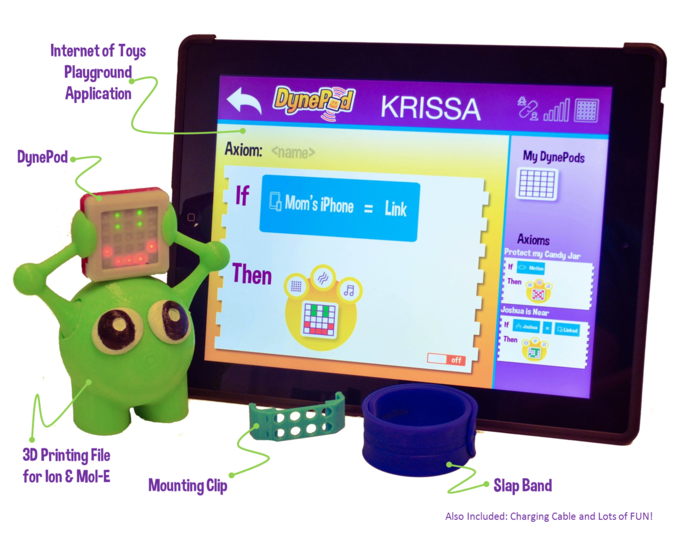
A new Kickstarter project wants to help mold the next generation of innovators. DynePods is a wearable, educational, programmable and connected toy that is designed to teach fundamental concepts of customization, programming, engineering and socialization.
“I am thrilled to be in the toy business,” said Krissa Watry, president and CEO of Dynepic, which developers DynePods. “Toys played a major role in my success, and I hope we can introduce foundational skills like design, 3D printing, and coding that will help our kids achieve their dreams and compete in this technology-driven world.”
The wearable features Dynepic’s If, Then programming language, Bluetooth LE, tablet control, multicolor display, movement sensor, gesture recognition, 3D printing, tablet game control, and parental controls.
Making a creative space for women in software
Intel recently released a report, “MakeHers: Engaging Girls and Women in Technology through Making, Creating and Inventing,” which revealed that enabling women and girls to develop, design and create things with electronic tools could build stronger interest and skills in computer science and engineering.
In addition the report provides key recommendations on how to engage women in making. Recommendations include:
• Creating more inclusive environments for women
• Designing places that allow open-ended investigations of projects meaningful to women
• Developing initiatives that give women more access to female mentors and makers of their own age
• Encouraging parents to create things with their children
• Aligning creative activities with current trends to attract women
• Including facilitators to provide a safe, supportive and inclusive environment
The full report can be found here.
Computer software self-repairs to tackle bugs
Computer scientists at the University of Utah have developed software that detects and destroys bugs, and automatically repairs the damage caused by them.
“It is a pretty big deal that a computer system could automatically, and in a short amount of time, find an acceptable fix to a widespread and important security vulnerability,” said Eric Eide, research assistant professor for computing science at the University of Utah.
The software, Advanced Adaptive Applications (A3), was co-developed by Raytheon BBN, a Massachusetts-based defense contractor, and was funded by DARPA’s Clean-Slate Design of Resilient, Adaptive, Secure Hosts program. A3 can detect previously unknown viruses and malware.
“A3 technologies could find their way into consumer products someday, which would help consumer devices protect themselves against fast-spreading malware or internal corruption of software components. But we haven’t tried those experiments yet,” said Eide.
State Department suffers from hack attack
The State Department is the fourth government agency to reveal a hack attack on its computer systems, the New York Times reported. The attack led to a temporarily shutdown of the agency’s unclassified e-mail system and public websites.
“This has impacted some of our unclassified e-mail traffic and our access to public websites from our main unclassified system,” a senior State Department official told the NYT.
According to the agency, there was no damage done to the department’s classified systems.






